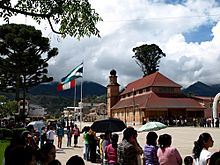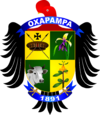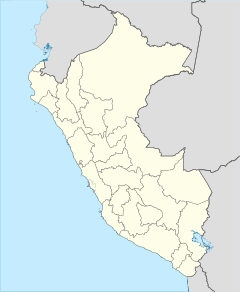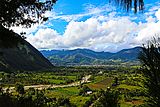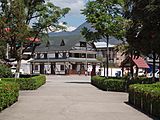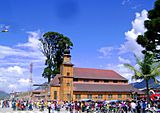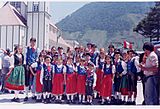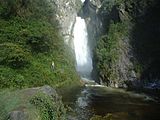Oxapampa facts for kids
Quick facts for kids
Oxapampa
|
|||
|---|---|---|---|
|
|||
| Country | |||
| Region | Pasco | ||
| Province | Oxapampa | ||
| District | Oxapampa | ||
| Founded | 1891 | ||
| Elevation | 1,814 m (5,951 ft) | ||
| Population
(2017)
|
|||
| • Total | 14,304 | ||
| Time zone | UTC−5 (PET) | ||
Oxapampa is a cool town in Peru. It is the main city of the Oxapampa District and Oxapampa Province. You can find it in the eastern part of the Pasco Region.
Oxapampa is located in a natural area called Selva Alta. This means "high jungle" in Spanish. It's a beautiful place with lots of green plants and hills. About 80 kilometers (50 miles) north, along the Huancabamba River, is another town called Pozuzo.
People in Oxapampa mostly raise cattle and grow coffee. These are very important jobs for the area.
The town was started in 1891 by settlers from Austria and Germany. These families had first settled in Pozuzo. Because of its history, Oxapampa still has a special German feel. You can see it in the buildings, which look like they belong in the Tyrol region of Europe. The town also celebrates its unique heritage with fun public events.
Oxapampa has a nice climate and pretty views. This has made it a popular place for tourists to visit. More people started coming after new roads were built in the 1980s.
What Does Oxapampa Mean?
The name Oxapampa comes from the Quechua language. It means "straw plain" or "grassy plain".
In Quechua, uqsha means "straw" and pampa means "plain" or a flat area. So, it's like saying "the flat land with straw."
The local Yanesha people call this place Koshapampó.
A Journey Through History
The story of Oxapampa began with a long journey. In March 1857, about 300 settlers from Tyrol (part of Austria) and Prussia (part of Germany) decided to move to Peru. They were mostly farming families looking for a new life.
They boarded a ship called the "Norton." After four months at sea, they finally arrived at Callao port in Lima. After a short health check, they took another ship to Huacho.
From Huacho, their journey became even harder. Their belongings were loaded onto mules. The men had to walk, while women and children rode donkeys. They traveled through places like Cerro de Pasco, Acobamba, and Santa Cruz. Some settlers decided to stop their journey along the way.
In 1858, the men in the group went ahead to Pozuzo. They wanted to divide the land and plant crops. This way, they would have food ready when their families arrived. Finally, in 1859, about 170 people settled permanently in Pozuzo.
Years later, in 1891, things were going well for the settlers. A group of them from Pozuzo decided to start a new town. This new town was Oxapampa, which is now the capital of the province. Later, they also founded the town of Villa Rica, south of Oxapampa.
Oxapampa's Weather
Oxapampa has a special kind of weather. It's called a Cfb climate, which means it's humid and subtropical with warm summers. Some people call it "eternal spring" because the weather is nice all year.
The weather is also affected by how high up Oxapampa is. It's at 1,814 meters (5,951 feet) above sea level. This makes the temperatures cooler than in other tropical places nearby. The difference between the hottest and coldest months is only about 2.2 degrees Celsius (4 degrees Fahrenheit)!
The months of June, July, and August are a bit drier. But for the rest of the year, there is a lot of rain.
| Climate data for Oxapampa, elevation 1,801 m (5,909 ft), (1991–2020) | |||||||||||||
|---|---|---|---|---|---|---|---|---|---|---|---|---|---|
| Month | Jan | Feb | Mar | Apr | May | Jun | Jul | Aug | Sep | Oct | Nov | Dec | Year |
| Mean daily maximum °C (°F) | 23.0 (73.4) |
22.8 (73.0) |
23.1 (73.6) |
23.4 (74.1) |
23.2 (73.8) |
22.9 (73.2) |
22.9 (73.2) |
23.6 (74.5) |
23.9 (75.0) |
24.0 (75.2) |
24.0 (75.2) |
23.2 (73.8) |
23.3 (74.0) |
| Mean daily minimum °C (°F) | 14.0 (57.2) |
14.1 (57.4) |
13.7 (56.7) |
13.1 (55.6) |
12.7 (54.9) |
11.8 (53.2) |
11.0 (51.8) |
11.0 (51.8) |
11.2 (52.2) |
12.7 (54.9) |
13.3 (55.9) |
13.9 (57.0) |
12.7 (54.9) |
| Average precipitation mm (inches) | 203.0 (7.99) |
223.4 (8.80) |
194.4 (7.65) |
96.2 (3.79) |
48.7 (1.92) |
30.9 (1.22) |
36.1 (1.42) |
42.1 (1.66) |
55.8 (2.20) |
108.4 (4.27) |
114.9 (4.52) |
195.9 (7.71) |
1,349.8 (53.15) |
| Source: National Meteorology and Hydrology Service of Peru | |||||||||||||
Gallery
See also
 In Spanish: Oxapampa para niños
In Spanish: Oxapampa para niños
 | Bessie Coleman |
 | Spann Watson |
 | Jill E. Brown |
 | Sherman W. White |


